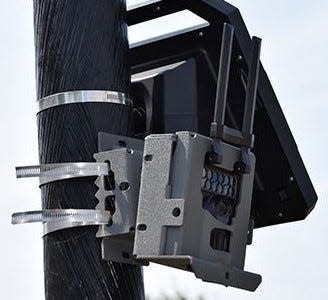Gadsden City Council OKs accord with Alabama Power for license plate recognition cameras
Law enforcement in Gadsden will soon have another tool at their disposal.
The City Council on Tuesday approved an agreement with Alabama Power Co. for the installation of 15 Flock license plate recognition cameras and three video cameras throughout the city.
And this is only “the tip of the iceberg,” as a council member put it, as the long-range plan is to deploy hundreds of the cameras.
Alabama Power will own, manage and maintain the equipment. It also will cover the Xfinity internet service required to run the cameras, and transfer real-time data to the city.

The city's cost will be $4,062 a month. There was a 60-day window for that price that expires next week, so the agreement was passed on its first reading after council members gave unanimous consent.
Ten of the Flock cameras will go up shortly, within about six weeks, according to Tena King, director of city services. They will be deployed based on crime statistics and the amount in traffic, although there will be at least one in each council district.
The other license plate recognition cameras will be placed on Alabama Department of Transportation rights of way, which requires state approval that King said will take about six months.
The primary goal of the cameras is to help law enforcement officers to be proactive, rather than reactive, in fighting crime.
“It will save manpower hours,” King told council members during their work session where the proposal was presented. “We have a great police department that solves a high percentage of crimes. This will allow them to do it faster.”
The video cameras will record footage that could conceivably help law enforcement track a crime suspects' flight through the city, and identify high-crime areas that need focused attention.
Council member Jason Wilson said it will be “after the fact” as far as helping solve crimes, but added, “We also hope it will be a deterrent for crime as well, knowing these cameras are out there and they exist.”
King in response to a council inquiry said the city chose not to equip the cameras with flashing blue lights as other municipalities have done, because of the danger of them becoming easy targets for people with guns wanting to do mischief. That could change down the road, she said, when the hope is that multiple cameras will be deployed and having a couple out of service wouldn't be an issue.
The hope is that Gadsden can eventually have law enforcement technology similar to the state-of-the-art East Metro Area Crime Center in Oxford. Last year, council members toured that facility, where a huge bank of monitors show footage from hundreds of cameras stationed throughout the area. The EMAC's services are available to law enforcement on all levels, including the FBI and the Secret Service.
A secondary goal of the cameras is to, hopefully, deter speeding drivers who have become a nuisance throughout the city, although no tickets will be issued based on the data gathered.
Gadsden police are handing out plenty of those at present, however, without the aid of technology, as part of an aggressive crackdown on speeders that's ongoing in rotating areas throughout the city.
King said officials regularly receive complaints about speeders “from every neighborhood.” She said writing tickets is not something law enforcement likes to do, but it's the only way to get drivers' attention in a situation that's “gotten out of hand.”
She noted that facilitating the quicker resolution of criminal cases through technology could free police to put more patrols on the streets to deal with speeders. “It's going to take some time to get our city back under control,” she said of the speeding problem, which flashing signs showing drivers' speeds have done little to ease.
In other action Tuesday, the council:
• Accepted bids for nuisance abatement grass cutting for 2024 in the seven council districts from three different vendors instead of one as in the past. (That vendor chose not to bid this year, according to city officials.) The rates are in the 1.5 cent to 2 cent range per square foot. The money already budgeted from that purpose was moved from the engineering department to the building department.
• Approved the reduction of the Gadsden Commercial Development Authority board from 13 to nine members.
• Approved the establishment of a seven-member Gadsden Arts Council designed to foster coordination, promotion and support between local artistic endevors and city institution. The goal is to advance and enrich the arts in Gadsden.
• Approved a concert July 18 at the Mort Glosser Amphitheatre with former Trick Pony member Keith Burns and Dreamers in the Round. The show will feature Burns and some fellow songwriters sharing some of their best work and telling the stories behind those songs. The agreement grants the group 95% of the ticket sales revenue.
This article originally appeared on The Tuscaloosa News: Gadsden will soon install license plate recognition cameras in city
